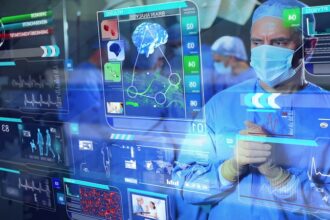Machine learning is already taking healthcare sector by storm, in more ways than one. Earlier, technologies like deep learning, machine learning, and artificial intelligence were regarded as pie-in-the-sky technologies. However, they have indeed come a long way, and now, you can see their various uses in the healthcare IT field.
They have majorly turned into some practical tools which are capable of helping healthcare institutions optimize their service provision. Also, on the other side, they are even helping care providers to improve the standard of care. But, just like any other technological invention, machine learning is also intended to help the healthcare market generate more revenue. But, even more so, improving the quality of treatment and reduction of risks is prioritized.
Most healthcare institutions or firms have started making use of machine learning in many ways. AI is also used by various healthcare app developers or even by wearables manufacturers. That’s not all: there is good use of machine learning and AI in the field of EHRs and EMRs as well. But at the same time, it is also said that making flawless, convenient EHRs with the help of machine learning will require a lot of effort from both healthcare providers and technology developers.
Though, the usability of machine learning is increasing, but is it same as the usability in other sectors? Well, not really, and we can definitely say that healthcare IT is undoubtedly still ripe for the next machine learning innovations. As we know that the healthcare data analysis market in the USA is expected to touch the $19 billion even before 2020. So, we need to have superb ML, AI and Big Data development tools for the healthcare sector to make use of the analysis and the data. We will find out more about the future of ML, AI, Big Data or Deep Learning in the healthcare space, in this article.
What is the present state of machine learning in Healthcare field?
The need for an ‘improved’ healthcare sector is creating the scope for ML and AI to disrupt the healthcare space. There’s no dearth of data, it is just that we have to harness the potential of all the data using the power of machine learning and artificial intelligence. Listed below are some areas where ML and AI have done significantly well:
Personalized Treatment
The use of electronic health records in healthcare has grown immensely. Therefore, now practitioners have a lot more access to the patient’s health data. Machine Learning algorithms are used to compile all the medical data of individual care seekers. This makes it easy for the care providers to not only detect, but to also assess health issues in a much more focused manner, simply because they can understand the situation of patient better. Also, they have access to the medical history of the patient, so even a patient misses out anything, the care provider can still look at it from the medical history.
As per this supervised learning, the doctors can carefully predict the risks to a patient’s health. This is based on the symptoms and genetic data which is present in the individual’s medical history. IBM Watson Oncology is doing exactly that! They are using the patients’ medical data as well as the medical history to develop a better treatment strategy centered on an optimized range of treatment options.
Imaging technology
Machine learning is helping the healthcare experts to process voluminous amount of imaging data immediately. The technology is making it extremely quick to carefully identify even the tiniest details in imaging results including the CT scans and the mammograms. The results are noticed much more efficiently and speedily as opposed to the human’s ability to do the same. Also, with the help of ML, it becomes easy for the newest imaging solutions to find conditions doctors are not looking for. Also, the new tools are helping the doctors to not ignore anything.
Future of ML and AI in the field of healthcare
Artificial intelligence and machine learning definitely have huge potential to resolve the issues which have plagued the healthcare space for years. Also, experts have started to realize the importance of these powerful technologies, thus we see the adoption rate increasing. But, still, there seems to be a lot more that these technologies are capable of doing. Therefore, we surely need to see more innovations in order to make sure that ML and AI are used in the best possible manner in the field of healthcare.
We would love to see ML and AI based solutions which are developed to boost the accuracy of diagnoses. Also, more tools that can make it easy to customize treatment would be better. Also, practitioners would really like to use the solutions that help them to crowdsource insight from more a lot more experienced fellows for some of the most intense cases.
At the same time, when it comes to preventative care, ML and AI can surely do a lot more. Physicians should be offered with powerful solutions to focus on overall wellbeing of a care seeker and not only treating a health condition.
Also, AI and ML powered robotics should be used more often for surgeries. They help to incorporate the real-time surgery metrics as well as all the information from successful surgical experiences to enhance the outcome of the surgery. Also, they are quite time saving as well. Therefore, there seems to be a lot that can be done to make sure that ML and AI are used to their fullest potential. But, needless to say, this nowhere means that these technologies are not used at the present. It is just that the use and the inventions have to increase as the healthcare space is now ready for them!
Is Machine Learning the same as Artificial Intelligence?
Machine learning and artificial intelligence are used interchangeably, but they are not exactly the same. Here’s how:
Let’s consider a newborn baby and a parent’s relation here for reference. When a parent teaches a newborn to say “mom,” “dad,” etc, the newborn picks up from what he or she is being taught. Whereas, few years later, they might even learn a few things without being taught as well. So, here, the newborn can be referred as a computer and the parent as an expert, developer, or a scientist. So, firstly, when the computer is taught to understand a certain patent it will. But, later, because of artificial intelligence the computer will automatically process the instructions in its own way. So, we can say that ML is an approach towards AI.
Conclusion
Plenty of tech geniuses are making attractive promises centered on innovations in machine learning or a few other leading-edge developments in the field of healthcare. However, all the innovations have to help the day-to-day clinical care. The possibilities are endless, but at the same time, there needs to be a focus (which is there) in order to create a tools that are beneficial for both the healthcare experts and the patients.









